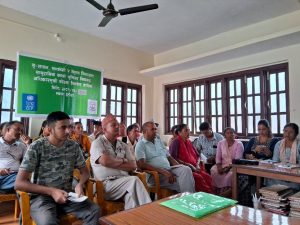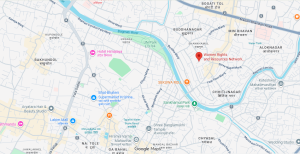 The training on governance, gender issues, GESI leadership and roles and responsibilities to Community Forest User Groups (CFUGs) based on the RBA plan developed was conducted on October 6 and 7, 2024 in Chuchhekhola CFUG. The training in Chuchhekhola CFUG was conducted for two days where first day emphasized on the clarification of terms and the content deliverables whereas second day focused on Right Based Advocacy (RBA) Plan preparation. The training was developed based on the Right-Based Advocacy (RBA) plan, which aims to enhance community engagement and promote sustainable forest management practices.
The training on governance, gender issues, GESI leadership and roles and responsibilities to Community Forest User Groups (CFUGs) based on the RBA plan developed was conducted on October 6 and 7, 2024 in Chuchhekhola CFUG. The training in Chuchhekhola CFUG was conducted for two days where first day emphasized on the clarification of terms and the content deliverables whereas second day focused on Right Based Advocacy (RBA) Plan preparation. The training was developed based on the Right-Based Advocacy (RBA) plan, which aims to enhance community engagement and promote sustainable forest management practices.
DAY-1
The training was attended by 30 participants, comprising members of the Executive Committee, the Enterprise Group, WRRN representatives, and facilitators. The program started with an introductory session led by Mrs. Kabita Gaire, who explained the objectives of the training and outlined the agenda for the day.
Afterward, participants were invited to introduce themselves, setting a cooperative and engaging tone for the session. Mrs. Kabita Gaire again took the lead to explore the key themes of Good Governance, Gender Inclusiveness, and Leadership Development. She explained that good governance involves creating systems of transparency and accountability, which are essential for effective decision-making within CFUGs. Mrs. Gaire highlighted how inclusive governance, especially in the participation of women and marginalized groups, strengthens community involvement and ensures more equitable outcomes. She also discussed the importance of developing leadership skills to foster a sense of ownership and responsibility in managing community resources. This laid a solid foundation for further discussions on how governance and inclusivity can drive community empowerment and sustainable development.
The training began with Mr. Ghanshyam Pandey introducing the concept of good governance in the context of community forest management. He explained that good governance is based on transparency, accountability, inclusiveness, and adherence to legal guidelines, ensuring that everyone in the community has a voice in the decision-making process and is aware of what is happening. Mr. Pandey emphasized that these principles are essential for sustainable forest management and long-term community benefits.
We delved into each of the governance principles, starting with transparency. The importance of clear and open communication within Community Forest User Groups (CFUGs), particularly regarding financial matters such as timber sales and budget allocation, was discussed. This ensures all members are informed about fund distribution and fosters trust. The next topic, accountability, focused on each CFUG member’s responsibility to explain their actions and decisions to the group. Leaders, in particular, were encouraged to provide regular updates to ensure alignment with the community’s interests. The theme of inclusiveness was also covered, highlighting that everyone, especially women and marginalized groups should have an active role in decision-making. Participants identified barriers that prevent these voices from being heard and brainstormed strategies to make CFUGs more welcoming and participatory.
While discussing good governance, participants brought up a troubling issue: 1 Bigha of community forest land has been encroached upon, and buildings have been constructed on it by prominent individuals. This isn’t just about land; it’s about fairness and the rights of the community. People feel disheartened seeing those in positions of influence misuse resources that belong to everyone. The encroachment reflects deeper problems of inequality and weak governance, leaving the community feeling overlooked and unheard. It’s a pressing issue that calls for immediate attention to restore trust and protect shared resources.
A discussion on gender issues followed, where Mr. Pandey shared a relevant example from abroad about men challenging child custody laws. This example illustrated that discrimination can take various forms depending on the context, prompting participants to reflect on gender equality in their own community forest activities. The conversation then shifted to the challenges women face in CFUGs, such as limited decision-making power and cultural biases. Participants shared personal stories and collectively explored practical solutions to promote inclusivity and ensure equal participation for all genders.
By the end of the day, participants gained a deeper understanding of how principles of good governance could be applied within their CFUGs, and how they can foster better decision-making processes and social equity in forest management.
Day 2:
On the second day, the focus shifted to Gender Equality and Social Inclusion (GESI) leadership and the roles and responsibilities of CFUG members. Ms. Aarati Pathak led the session, beginning with an interactive activity where participants listed household tasks typically performed by men and women over a 24-hour period. The results highlighted the disproportionate workload often shouldered by women, despite their active participation in self-development and community work. This realization sparked meaningful discussions on how to better recognize and value women’s contributions.
The session emphasized the need for strong, inclusive leadership, where everyone—regardless of gender or social status—has their voice heard. Ms. Pathak shared examples of CFUGs that successfully embraced diversity and inclusivity in leadership, inspiring participants to reflect on their own practices. The group discussed ways to empower women and marginalized groups to take on leadership roles, suggesting solutions such as mentorship programs and rotating leadership positions to make leadership opportunities more accessible and inclusive.
The conversation also covered the specific responsibilities of CFUG members, particularly in sustainable forest management, monitoring resource use, and implementing conservation strategies. The importance of inclusive decision-making in these processes was emphasized, as diverse perspectives can lead to better community and environmental outcomes. Participants reflected on their roles and responsibilities, and how they can balance conservation with equitable resource use in their CFUGs.
By the end of the day, participants felt energized and more equipped to lead with inclusivity in mind. They left with a renewed sense of purpose and commitment to building stronger, more equitable communities through their CFUGs.


